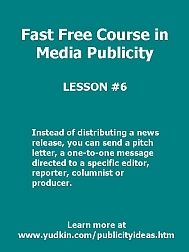| |
Marcia's Fast Free Course in Media Publicity
The article below is the sixth
of seven articles that give you a quick,
well-rounded introduction to the fundamentals of
getting media coverage for yourself, your book,
your business or your cause. After reading
this piece, click on "NEXT" to
read the next article in the series. START
AT THE BEGINNING.
Pitch Letters Can Make You a Called-Upon Source
by Marcia Yudkin
Ever wonder how reporters and producers rustle up sources for perspective on fast-breaking stories? Often they call people they've interviewed before, whom they know they can reach and depend upon for pithy quotes. But to stay on top of their game, the media must always widen their pool of informants with new experts and spokespersons. You can become called upon for your viewpoint by writing a pitch letter.
|
Whereas a press release is an impersonal communication designed for many eyes, a pitch letter should be a one-to-one message directed to a named reporter, editor, columnist or producer. It's best if you show familiarity with the column, section, publication or show. The idea here is to introduce yourself in writing, describing your credentials and offering your expertise on particular topics.
By "credentials" I don't necessarily mean degrees, certifications, licenses and job titles. These may enter into the picture, but years of experience and the breadth of your background may equally make you an appealing source.
|
 |
Credentials can even include events normally viewed as negative, such as your having been convicted of a crime (e.g. as a computer hacker) or having suffered a terrible loss (e.g., having been conned by an employee). Anything that would make the audience think that you're someone equipped to comment on the topics you've identified counts as a credential.
|
Got Content?
Then Get Gobs of Additional Publicity!
Convert existing content into press releases
for a three-pronged second round of business
visibility: a good shot at media
exposure, new readers for your content and increased web
traffic. Using the tips in this
report, cash-flow expert Caroline Jordan
spent 15 minutes transforming a set of
tips into a release that got her onto
sites for the Boston Globe, the San Francisco
Chronicle, Fox
News, CBS, ABC, UPI, Banks.com and many others. Publicity
strategy for content czars. |
Be both general and specific in describing the topics on which you're equipped to comment. The media person needs a general category into which to slot you, such as "local political campaigns," "family-owned businesses" or "plastic surgery, against." By being more specific as well, you have a chance to spark articles or segments on the topics dearest to you and on which you can truly shine. For example, you could write, "As a second-generation home
schooler, I understand both the creativity it sparks and the isolation from peers it can produce."
Probably the most important thing you can do in your letter, and the reason I recommend you send it by postal mail rather than by
email, is to enclose a business card. Better yet, print up Rolodex cards designed to fit into a rotary file for this purpose, with your category of expertise on the outer tab. Yes, media people still do use these gadgets, with which they can identify an appropriate expert in seconds.
If nothing happens after you send a batch of pitch letters, relax. This is normal. A few months later, find an excuse to contact the same bunch of media folks again, such as by mentioning a new credential, enclosing an article you've written or providing some thoughts on a controversy coursing through the news.
|
Improve Your Odds for Media Coverage
Discover how to generate dozens of ideas that reporters, broadcasters - and your prospective customers - love. Inject dynamism, relevance
and surprise into your media pitches.
Learn how to distill your message so it captures attention right away, then bolster your credibility and eliminate factors that turn off editors and producers.
Publicity success course. |

Publicity success course |
|
Not long after the impeachment of President Clinton, I read some commentary concerning a law professor who had become a regular on TV talk shows during the controversy even though his specialty was not election law. Insiders explained why he became a favorite: he returned media calls within half an hour and provided meaty "sound bites" while on the air. Take a lesson from his success!
Copyright 2003 Marcia Yudkin.
All rights reserved. NEXT
ARTICLE.
Online Courses Related to Publicity
The Press Release Makeover Course
Deep Publicity
Marketing for Introverts
Create a Practical Marketing and Publicity Plan |






